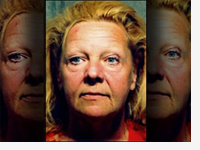Iowa Murder Case
Illness complicates Florida woman's desire to plead guilty to killing ex-husband at Iowa mall

Debi Joy Olson freely admits that she stalked her ex-husband across the country, then stabbed him to death last summer at a mall in Davenport.
She is representing herself in court, saying she wants to plead guilty and go to prison. Her only regret, she says, is that she can't be extradited to her home state of Florida where she could face the death penalty.
But what seems like a simple case has been complicated and is nowhere near completion because the 53-year-old woman apparently suffers from Huntington's disease, a progressive genetic disease that degenerates brain cells.
That has led the court to question her mental competency. A judge has ordered a competency evaluation and threatened to obtain medical samples by "nonconsensual means" if Olson doesn't cooperate.
Olson, of Sarasota, Fla., faces charges of first-degree murder and willful injury in the killing of Mauricio Droguett, her husband of about 20 years.
"I gave up my Country, my relatives, my friends for him 25 years ago. I will give up the rest of my life for Him now," she wrote to District Court Judge James E. Kelley in a letter titled "Confession to First Degree Murder."
"I need to plead guilty now ... I want to go to prison for life," she wrote in the letter, dated Oct. 14, 2008.
Olson is accused of stabbing her ex-husband 10 times at the Northpark Mall on July 10. Droguett was a comptroller for Carson & Barnes Family Circus, a Florida-based operation that was setting up in the mall parking lot.
In a series of letters to the judge, Olson detailed how she tracked Droguett across the country, bought a hammer and knife, and then confronted him in front of about a half-dozen witnesses.
In one of the letters, she wrote that no one except she and her ex-husband will ever know why she killed him, and that she "did not kill him out of anger, it was out of love."
Olson was arrested a short time later, and police said she immediately confessed and cooperated with the investigation. Court records show she also told an officer that she had Huntington's.
Since her arrest, however, as court officials have questioned whether she can understand the proceedings, Olson has been less responsive and has refused to share her medical records or be evaluated by doctors.
Huntington's causes slurred speech and stumbling in its early stages, and as it progresses the person suffers uncontrolled movements, loss of intellectual faculties, and emotional disturbance.
Olson discharged her lawyer two months after her arrest and chose to represent herself. In court documents, the judge expressed concern about that decision and ordered a mental competency evaluation.
"The Court became concerned during her answers that at times she referred to her deceased husband in the present tense and sometimes in the past tense," Kelley wrote.
Olson refused to be examined in November by experts from the University of Iowa Hospitals and Clinics. In response, the judge ordered the examination to be held at the Iowa Medical Classification Center in Oakdale, although he was told a lack of psychiatrists at that prison meant the evaluation couldn't be done there.
At a hearing last week, the judge ordered University of Iowa Hospitals and Clinics experts to test Olson to determine if she suffers from any mental or physical disease, to obtain her medical records and provide treatment.
He said that if Olson doesn't cooperate he will authorize officials to obtain medical samples of bodily fluids without her approval. A date for the evaluation wasn't immediately available.
There is little precedent for obtaining samples against someone's wishes to test for an illness, said James Tomkovicz, a law professor at the University of Iowa.
Mark Dobson, a law professor at Nova Southeastern University in Fort Lauderdale, Fla., also called the situation unusual.
"The question is whether the interests of the state outweigh her interest of bodily integrity," he said. "The state has an interest in making sure any plea entered into is knowing and intelligent so that she can't come back years from now" and challenge the validity of the plea.
In some of her letters, Olson told the judge that she wanted court officials to "stay out of my business."
"I wish I could of been extradited back to Florida and face the Death Penalty and you know I'd be OK with that too," she wrote in a letter from October. "I do not think it's fair to me about this evaluation."
A few months later, she threatened to contact the U.S. Supreme Court and told Kelley: "I truely belief you are purposely letting me sit Here for whatever reason unnecessarily."
Weeks later, though, she asked to be sent to the Oakville facility, saying she was doing poorly at the Scott County Jail. In a letter this month she warned: "My memory is going: I wouldn't want to forget what I did!"
In a Jan. 7 letter she asked that a Huntington's disease specialist be present at her next hearing, but it's unclear if a specialist was available or whether her request meant she was ready to submit to testing.
The judge refused to comment on the case.
Assistant Scott County Attorney Jerald Feuerbach said, "She appeared a little bit more receptive than in the past, but until she actually sees the doctors, I don't know."
(Published by ABC News - January 24, 2009)